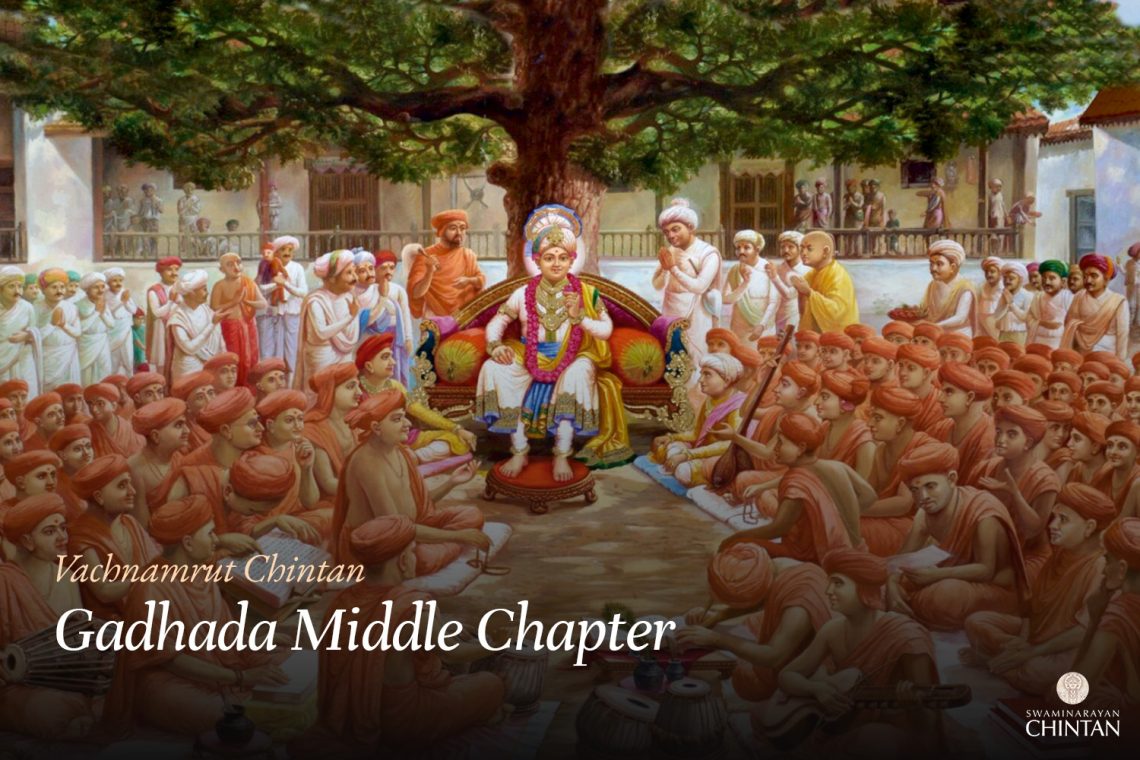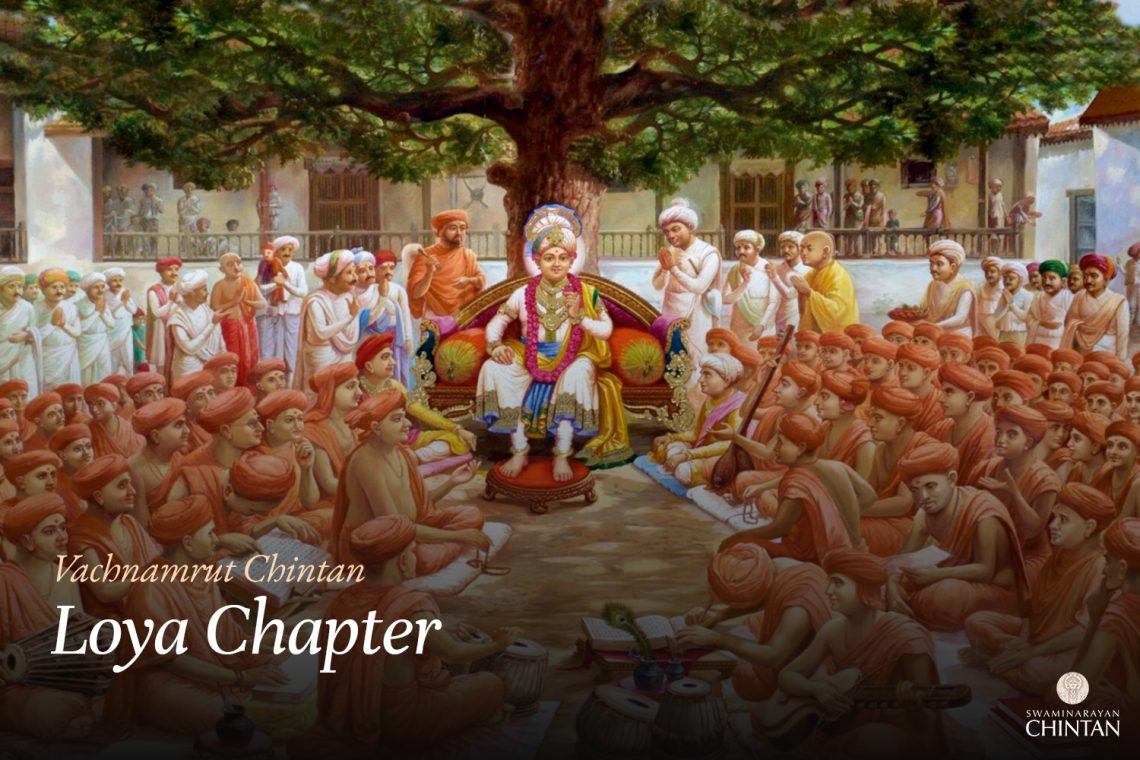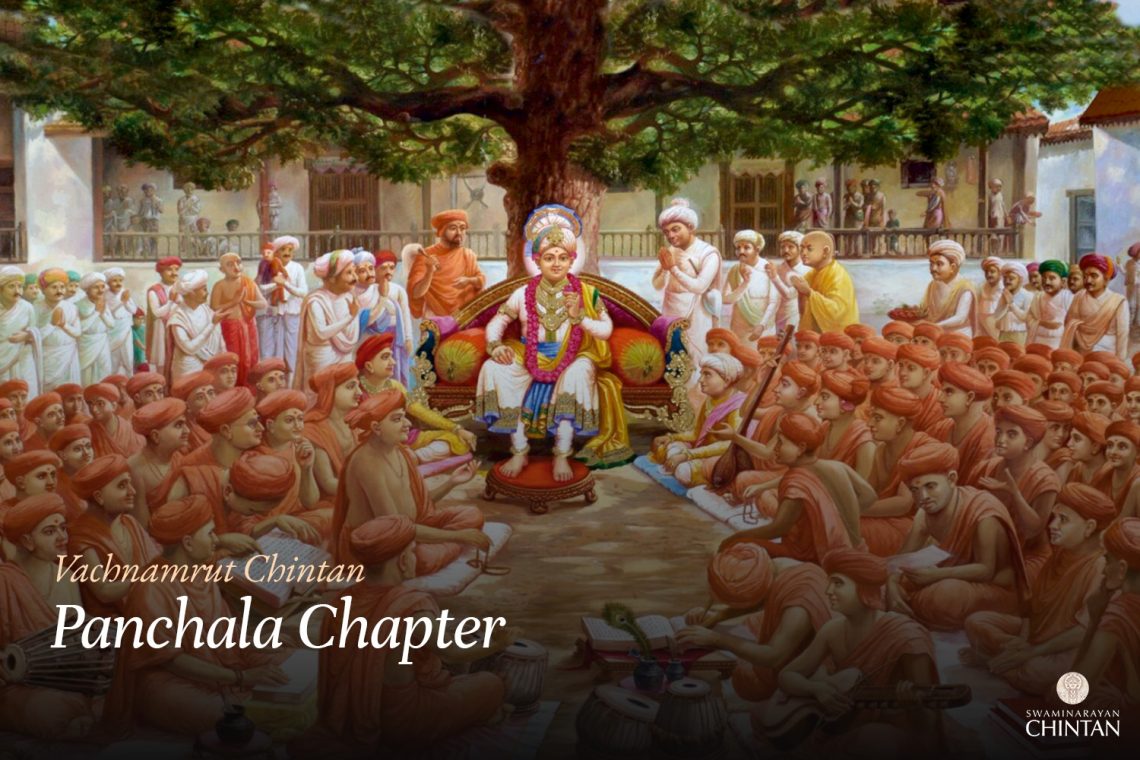Central Insights: Key Points: Explanation: This Vachanamrut emphasizes the importance of firm faith and steadfastness in Satsang. Maharaj instructs that a devotee of Bhagwan must maintain unwavering fidelity (pativrata) towards Shreeji Maharaj (Bhagwan) and show courage in upholding Satsang. In a devoted wife, fidelity is the foremost quality, not judgment…
Browsing CategoryVachanamrut Chintan
GM-04 Constant Contemplation Is Achieved through Mahatmya and Shraddha
Central Insights: Key Points: Explanation: In this Vachanamrut, Shreeji Maharaj poses a question: Suppose a devotee follows the Dharma (moral duties) prescribed by the scriptures and also engages in the worship of Bhagwan (God), but faces a situation where either Bhakti or Dharma must be sacrificed to preserve the other.…
GM-03 The Path of Amorous Devotion and Atmagyan(Self-Realization)
Central Insights: Key Points: Explanation: In this Vachanamrut, Maharaj explains that there are two methods for a devotee to attain a high spiritual position, and both can also lead to downfall. The first is by worshipping God on the path of amorous devotion (rasik marg), and the second is the…
GM-02 A Small Stream let of Water
Central Insights: Key Points: Explanation: In this Vachanamrut, Maharaj says that one who desires to attain Atyantik Kalyan (ultimate liberation) and become a sage like Narad or Sanak should reflect upon what He is about to explain. He then discusses three key concepts that one should ponder: the origin of…
GM-01 The Cause of Moh
Central Insights: Key Points: Explanation: In this Vachanamrut, Sadguru Muktanand Swami posed a question: “Oh Maharaj, what is the nature of Moh? And what is the remedy to remove Moh?” In response, Maharaj first explained the nature of Moh. Maharaj states that the form of Moh can be recognized when…
L-18 Conviction of God
Central Insights: Main Points: Commentary: This Vachanamrut focuses on nischay (conviction or firm faith). Maharaj says that we must first decide what the original form of Bhagwan in His divine abode is like. Once this decision is made, a devotee should worship and engage in the upasana (wordship) of Paramatma’s…
L-17 Reverence and Condemnation
Central Insights: Main Points: Commentary: This Vachanamrut discusses the shift from praise to criticism. Initially, Maharaj compassionately explains the powerful nature of Maya (the illusionary power of God), noting how someone who may seem virtuous when first entering Satsang (holy fellowship) or taking shelter in a Sant ashram may later…
L-16 Characteristics of Blunted and Eradicated Vasana
Central Insights: Main Points: Commentary: This Vachanamrut is focused on the eradication of vasana. At the beginning of the discourse, Maharaj asked the paramhansas about the characteristics of one whose vasana has not been blunted, meaning their desires remain sharp, and of one whose vasana has been eradicated. Then, Maharaj…
L-15 Explaining Atmadarshan Using the Analogies of a Doll and a Cow
Central Insights: Main Points: Commentary: This Vachanamrut begins with Maharaj’s merciful words. The Jeev pervades all bodies through Adhyatma (spiritual), Adhibhoot (material), and Adhidev (divine) principles. Adhyatma refers to the subtle body, as expressed in the phrase, “Atmani adhikrutya vartate iti adhyatmam,” where the word Atma refers to the mind.…
L-14 On Likings of Shreeji Maharaj
Central Insights: Main Points: Commentary: This Vachanamrut discusses Maharaj’s likings and views. Shreeji Maharaj spoke to the Santo, mentioning that previous preceptors had their individual preferences. Each of these preceptors, in their writings, have occasionally narrated various things, but ultimately, they emphasize their own preferences. Thus, one can understand their…
L-13 Remaining Undefeated by Adverse Place and Time
Central Insights: Main Points: Commentary: In this Vachanamrut, Gopalanand Swami asks Brahmanand Swami a question: “What type of person remains undefeated by Desh, Kal, etc., and what type of person is subdued by them?” Swami states that according to what we have heard, Brahma was infatuated upon seeing Saraswati, Shivji…
L-12 The Six Types of Faith
Central Insights: Main Points: Commentary: This Vachanamrut explains the six types of nishchay (faith). There are two main types of nishchay: one is savikalp nishchay (conditional faith), and the other is nirvikalp nishchay (unconditional faith). Establishing a connection between the intellect or the soul (jiv) and Paramatma is called nishchay.…
L-11 Understanding of Saintly and Vicious People
Asserted Topics: Main Points: Commentary: This Vachanamrut discusses the understanding of vicious and saintly people. In this Vachanamrut, Shukmuni asks Maharaj how a vicious person and a saintly person grasp the teachings of the shastras. Maharaj replies by first pointing out that their opinions on meditation differ greatly. Saintly people…
L-10 The State of Remaining Uninfatuated
Central Insights: Main Points: Commentary: In this Vachanamrut, Nityanand Swami asked a question: In this world, why do some people become so attached to objects like women, etc., that they feel they would die if separated from them, while others have a more ordinary level of attachment? If these two…
L-09 The Cause of the Emergence of Dharma and the Other Three
Central Insights: Main Points: Commentary: 1. Characteristics: धरति धारयति वाा लोकान् इति धर्मः ।Dharma: Dharati dhārayati vā lokānīti dharmaḥ(Dharma is that which upholds and supports all beings).धर्मो ज्ञेयः सदाचारः श्रुतिस्मृत्युपपादित : ।dharmo jñeyaḥ sadācāraḥ śruti-smṛty-upapāditaḥ |(Dharma jāneyah (Dharma is known through good conduct)as established by Shruti and Smriti(Vedic texts and…
L-08 Voiding the Restlessness of the Senses; Accepting Only Words Related to One’s Inclination
Central Insights: Main Points: Commentary: Why does a wise person find faults with a Sant (saint)? In response, Maharaj says that a wise person perceives inappropriate traits in his own nature, and with a deep sense of dveshbuddhi (intense dislike) towards those traits, he actively works to remove them. When…
L-07 Realising God through the Senses, Conscience and Experience
Central Insights: Main Points: Commentary: his Vachanamrut discusses knowledge that is attained through the Indriyas, Antahkaran, and personal Anubhav (experience). Is the cause of the Jeev’s liberation Gyan or Bhakti? Or are there other means? In this Vachanamrut, Maharaj deeply elaborates on this topic using references from the Vedas and…
P-07 The Maya Of A Magician
Central Insights: Main Points: Commentary: This Vachanamrut is centered around the analogy of the rope trick charmer. Just as a rope charmer performs illusions before a king, first tying his weapons and climbing into the sky to fight the demons, the enemies of Indra, and then falling in pieces to…
P-06 Those with Firm Upasana Attain Liberation
Central Insights: Main Points: Commentary: This Vachanamrut emphasizes the importance of firmness in Upasana. What does it mean to have firmness in Upasana? It means to firmly believe that the Maharaj we have encountered is the master of all realms of creation, and to worship Him with this firm conviction.…
P-05 Pride And Humility
Central Insights: Main Points: Commentary: In this Vachanamrut, Swayamprakashanand Swami asks Maharaj the question: “Where is it advisable to maintain self-respect, and where is it not? Where is it advisable to be humble, and where is it not?” In response, Maharaj explains that it is important to maintain self-respect in…
P-04 Perceiving Divinity in the Human Traits of God
Central Insights: Main Points: Commentary: This Vachanamrut emphasizes the importance of developing firmness in conviction. In the Vachanamrut, Munibava asked Brahmanand Swami a question: “At first, one may have firm conviction in Bhagwan, engage in devotion and remembrance, but later, upon seeing Bhagwan’s human actions, one’s conviction begins to waver.…



